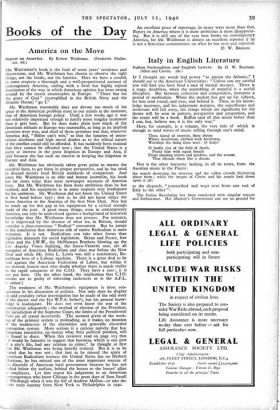Books of the Day
America on the Move
MR. WAITHMAN'S book is the fruit of some years' residence and observation, and Mr. Waithman has chosen to observe the right things, not the freaks, not the fanatics. Here we have a candid, in some respects a thorough and a well-proportioned account of contemporary America, ending with a brief but highly topical description of the way in which American opinion has been swung around by the recent catastrophes in Europe. " There but for the grace of God " (exemplified in the British Navy and the Atlantic Ocean) " go I."
Mr. Waithman reasonably does not devote too much of his space to the American problem most in our minds at the moment, that of American foreign policy. Until a few weeks ago it was not relatively important enough to justify more lengthy treatment than it gets here. But he does make plain how much of the American attitude to Europe was reasonable, as long as its implied premises were true, and chief of those premises was that, whatever America did, " Hitler can't win," so that the luxuries of osten- tatious aloofness and high moral doubts as to the ethical nature of the conflict could still be afforded. It has suddenly been realised that they cannot be afforded now ; that the United States is a party at interest in the great litigation in Europe and Asia, if only because she has such an interest in keeping the litigation in Europe and Asia.
Mr. Waithman has obviously taken great pains to master the essential facts, to get them in proper perspective, and he has tried to discard merely local British standards of comparison. And since Mr. Waithman is an able and honest journalist, his book has far more value than most newspaper accounts of America have. But Mr. Waithman has been more ambitious than he has realised, and his equipment is in some respects very inadequate for his ambition. Mr. Waithman did not know the United States at first hand before 1937 ; that is, he did not know either the boom America or the America of the first New Deal. Nor has he made up for this gap in his equipment by a critical enough study of the past. A great many things, even in contemporary America, can only be understood against a background of historical knowledge that Mr. Waithman does not possess. For instance, he is impressed by the absence of what we, in Britain, should consider a class-conscious " Radical " movement. But he jumps to the conclusion that American talk of native Radicalism is mere nonsense. It is not. Radicalism can take other forms than legislative demands for social legislation. Bryan and Foster, free silver and the I.W.W., the McNamara Brothers blowing up the Los Angeles Times building, the Sacco-Vanzetti case are all examples of American Radicalism and class war before 'the New Deal and while Mr. John L. Lewis was still a reactionary, Re- publican boss of a Labour machine. There is a great deal to be said against the American Federation of Labor, but within it are shrewd, honest men who doubt whether there is much reality in the rapid conquests of the C.I.O. They have a case ; it is not put here. (On the other hand, the implication that C.I.O. unions are as guilty of tolerating racketeers as is the A.F.L. l• unjust.) The weakness of Mr. Waithman's equipment is most con- Ticuous in his discussion of politics. Not only does he display an odd credulity (what investigation has he made of the odd story of the doctor and the $10 W.P.A. bribe?), but his general know- ledge is inadequate. He does not even know the text of the constitution adequately ; the method of election of the President, the jurisdiction of the Supreme Court, the limits of the Presidential Veto are all stated incorrectly. The account given of the work- ing of the primary system is misleading, as it makes no mention of the weaknesses of the alternative and generally discarded convention system. More serious is a curious naivety that few American journalists, no matter what their political position, will re found to share. When this reviewer read on page 113 that
it would be fantastic to suggest that business, which is one part :1 a city's life, had any relation to crime," he thought at first 'hat Mr. Waithman was being heavily ironical. But it is to be ared that he was not ; that just as he missed the spirit of American Radicalism because the United States has no Herbert Aorrison, he has missed one of the most important sources of
le discredit of American local government because he has not
.oked below the surface, behind the bosses to the bosses' allies
r employers. Let him repeat his judgement to an American -.ewspaperman who knew Chicago in the great days of Sam Insull
Pittsburgh when it was the fief of Andrew Mellon—or take the .lort train journey from New York to Philadelphia in 1940.
An excellent piece of reportage, in many ways more than that, Report on America where it is most ambitious is most disappoint- ing. But it is still one of the very best books on contemporary America, for Mr. Waithman is always an excellent reporter if he is not a first-class commentator on what he has seen and reported.
D. W. BROGAN.


























 Previous page
Previous page